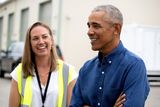Barack Obama’s Work: What We Do All Day on Netflix: docuseries doesn’t put the hours in
The former president’s extraordinary charm cannot paint over the structural cracks in this series


Never have a great subject and a presenter this good been brought together on television. Barack Obama’s new Netflix series Work: What We Do All Day should be fantastic.
It is not fantastic, but it is a pretty vivid recruiting ground for Marxism. Hurrah!
That’s a strange thing to say about a programme presented by a former president of the United States but the problem with the show is that it is not political enough. There is no analysis of how the workers of the world (well, the US) got into their current situation; Barack’s best mate Bruce Springsteen would have been a lot more radical.
Of course, Bruce could afford to be more radical because he is a billionaire, but Barack and Michelle are not far behind him moneywise, and a good part of their fortune has come from their lucrative deal with Netflix. This deal is never mentioned in the series, which is a bit much when you are asking people at the opposite end of the pay scale what they earn. Refreshingly, one chief executive, Jeanette, earns barely $43,000 per year. But then Jeanette is in Mississippi, is black and working in healthcare, and is also a good person.
The second surprise comes from a person at the very top of the commercial tree, Natarajan Chandrasekaran, known as Chandra. Chandra is a chairman of the Indian mega-giant company Tata. One of six children and born on a farm in rural India, he says that he wasn’t that different from anyone he grew up with, and that there are talented people everywhere. However, he is not the only successful person interviewed here to have had a mother who was in dire financial straits and whom they witnessed working incredibly hard to provide for her children. Perhaps not coincidentally, Chandra’s wife seems cool.
The four-part series is gracious in acknowledging the inspiration behind it: Studs Terkel, the American socialist (although the word socialism is never mentioned) who published Working: People Talk About What They Do All Day and How They Feel About What They Do. This was a series of interviews with (mainly white) Americans and it was groundbreaking when it was published in 1974. According to Barack, this series wants to be the modern version of Terkel’s great work.
President Barack Obama shopping with Randi Williams in Working: What We Do All Day. Photo via Netflix
But it’s not. Instead, it is a series of interviews with good people doing frequently rotten jobs. Nobody talks about mistakes they have made, bosses who are exploiting them, a system that is not, to put it mildly, on their side.
One of the problems is that all four episodes are based around three businesses: the Pierre hotel in New York; the start-up Aurora, which is just about to go public with its driverless cars; and Jeanette’s Home Care company in Mississippi. So we see Luke, a freelance data manager at Aurora, and also Chris who is one of the company’s founders.
We see Elba ,who is a chambermaid at the Aurora, and also Francois, its general manager, and Chandra, head of the section of Tata that owns it.
The series never moves from these three companies.
Barack Obama’s extraordinary charm and perfect voiceover cannot paint over these structural cracks. But the bottom line is that for your average viewer, who is your average worker, this series just doesn’t work hard enough.







